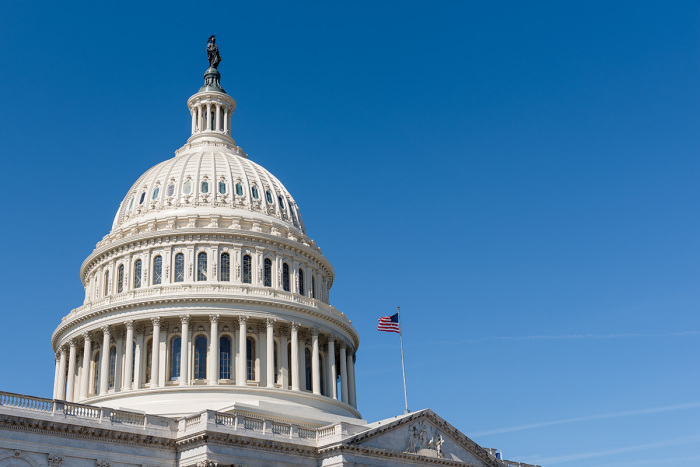Ban on military health plans covering sex changes for minors passes House

The U.S. House of Representatives passed a defense funding bill Wednesday that would prohibit military healthcare plans from covering gender transition procedures for minor relatives of service members.
The Republican-controlled lower chamber passed an amendment to the WILD Act in a 281-140 vote titled the Servicemember Quality of Life Improvement and National Defense Authorization Act for Fiscal Year 2025.
The measure contains a provision banning the TRICARE Program — "the health care program for uniformed service members, retirees, and their families around the world" — from providing coverage for "medical interventions for the treatment of gender dysphoria that could result in sterilization" for children under the age of 18.
The vote mostly came down along party lines, with most support for the measure coming from Republicans and most opposition coming from Democrats. Two hundred Republicans and 81 Democrats voted for the legislation, while 124 Democrats and 16 Republicans voted against it.
The WILD Act, which stands for the Wildlife Innovation and Longevity Driver Reauthorization Act, "reauthorizes through FY2028 and revises several conservation programs for wildlife species and their habitats, including the U.S. Fish and Wildlife Services' Partners for Fish and Wildlife Program as well as programs that provide financial assistance for African elephants, Asian elephants, rhinoceroses, tigers, great apes, and marine turtles."
The future of the bill and the provision banning minor gender transition procedures from the TRICARE Program now rest in the hands of the Democrat-controlled U.S. Senate and President Joe Biden, a Democrat who must sign the bill before it can become law. The U.S. Senate could opt to remove the provision from the measure or leave it as is. Should Biden veto the bill with the provision in place, it would take the support of two-thirds of both the U.S. House and the U.S. Senate to override the veto.
Christian conservatives, like Family Research Council President Tony Perkins, praised the amendment's passage, writing on social media that the "good news keeps rolling on the National Defense Authorization Act."
The measure was condemned by LGBT activists, including Human Rights Campaign President Kelley Robinson.
"Today, politicians in the House betrayed our nation's promise to those who serve. Not since the 'Defense of Marriage Act' passed almost 30 years ago has an anti-LGBTQ+ policy been enshrined into federal law," Robinson wrote in a statement. "For the thousands of families impacted, this isn't about politics. It's about young people who deserve our support."
The inclusion of a provision banning the military's healthcare program from covering gender transition procedures for youth with gender dysphoria comes as more than half of U.S. states have banned minors from obtaining some or all forms of the life-altering interventions.
Last week, the U.S. Supreme Court heard oral arguments over the legality of Tennessee's ban on sex-change surgeries and puberty drugs for minors struggling with gender dysphoria. A decision is expected sometime in the coming months.
The efforts to prevent or discourage the provision of puberty-blocking drugs, cross-sex hormones and body-mutilating gender transition surgeries for minors stem from concerns about their long-term impact.
The American College of Pediatricians has listed the possible side effects of puberty blockers as "osteoporosis, mood disorders, seizures, cognitive impairment and, when combined with cross-sex hormones, sterility." Meanwhile, the conservative medical organization has warned that cross-sex hormones can cause "an increased risk of heart attacks, stroke, diabetes, blood clots and cancers across their lifespan."
Gender transition surgeries, which involve the removal of body parts that align with an individual's biological sex and the creation of artificial body parts that correspond to an individual's stated gender identity, can leave behind unsightly scars left behind following the mutilation of healthy breast tissue from trans-identified females as well as the removal of forearm tissue used to create an artificial penis for females who wish to identify as male.
Last year, prominent detransitioner Chloe Cole filed a lawsuit against medical providers who pushed her to obtain life-altering procedures as a child. The complaint details how Cole, who once identified as a member of the opposite sex but has now seen her gender dysphoria subside, experienced suicidal thoughts after receiving a double mastectomy as a teenager.
The lawsuit contended that Cole's experience with gender transition procedures as a whole has left her with "deep physical and emotional wounds, severe regrets, and distrust of the medical system."
Health authorities in other countries are beginning to take a more cautious approach to how they handle children who report struggling with gender dysphoria.
In the United Kingdom, England's National Health Service announced in June 2023 that it would only commission puberty-suppressing hormones as part of clinical research, restricting the use of hormone drugs for gender transition outside of clinical trials.
Most recently, the New Zealand Ministry of Health released a report stating there is limited evidence supporting the use of puberty-blocking drugs for children suffering from gender identity issues. The ministry announced a public consultation process, inviting submissions until late January 2025 to assess whether additional safeguards should be established that could include regulatory measures to further restrict or condition the prescription of puberty blockers.
Ryan Foley is a reporter for The Christian Post. He can be reached at: ryan.foley@christianpost.com





























